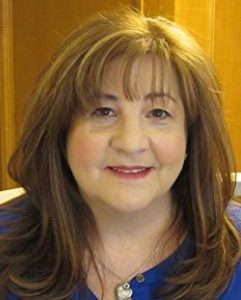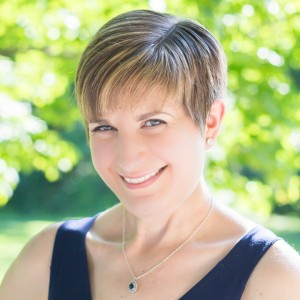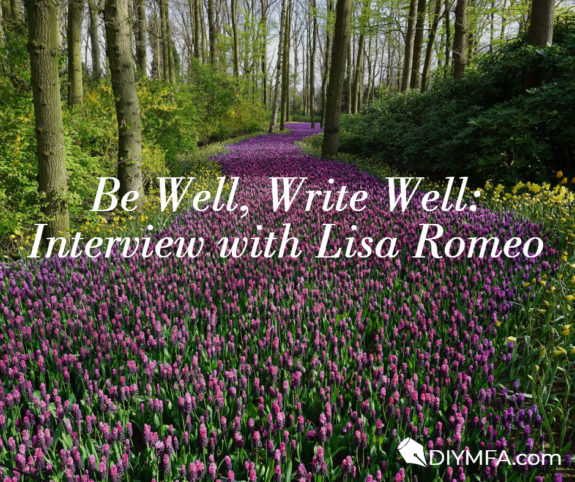Hello, readers! I hadn’t planned on doing another “Be Well, Write Well” interview after the series of three last winter, but when the opportunity arose to interview Lisa Romeo, I couldn’t turn it down. I first met Lisa at the Hippocamp Conference for Creative Nonfiction in the summer of 2016. Her workshop on mining root sources to expand material for personal essays and articles was a complete game-changer for me. I credit that workshop with helping me to sell and even win a competition for three new pieces in the next six months. Lisa’s debut memoir, Starting with Goodbye: A Daughter’s Memoir of Love after Loss is releasing on May 1st, and I can’t wait to absorb more of her wisdom through her new book and the interview below.
Lisa, thank you so much for being my guest on “Be Well, Write Well.” You’re days away from your book release date. With the added stress and excitement during this time, what’s one wellness-related habit you’re prioritizing, and why?
Getting away from the office/computer at somewhat regular intervals. A change of scene can replenish me even if it’s just a quick run to the grocery store (or, I must admit, to Nordstrom’s for a pair of fun summer sandals on a March snow day – not that I did that yesterday!). For many months leading up to the book launch, I’ve had a lengthy checklist, endless emails, plus all the normal work tasks. It can all be a bit much—and I’m a workaholic anyway. So simply getting out, having a conversation with someone who doesn’t even know what an advanced reading copy is, helps with the stress.
What is your usual writing routine? Does it change when you’re on a deadline, or when you’re nearing a book release?
I’m afraid I don’t have a “usual” routine, given that I have many different jobs—teaching online and in person, editing, coaching, speaking/presentations; writing time has to be flexible depending on the academic semester, client needs, travel, etc.
Deadlines are what saves me, always. They’re paramount, and if I’m given an open-ended assignment, I will insist on a deadline anyway! They provide a hard boundary and force me to be organized and plan well.
I suppose the only thing that’s usual about my writing routine—and what I advise students and coaching clients—is to write regularly no matter what. Sometimes that’s everyday, sometimes it’s twice a week. I do notice I get cranky and feel put-upon when I don’t write regularly.
This is my first solo book launch, and yes, everything seems to be affected by it, everything is a bit upside down—routines, the condition of my office, the muddled state of my brain! That’s a little unsettling and also very exciting. You only get to launch your first book once, so I’m trying to enjoy it amid the chaos and pressure to get so much pre-publication promo done.
What are your essential writing “tools?” Where do you write?
So lucky am I to have had an entire room of my own since 1990. I do love my home office, which I made-over five years ago, replacing hand-me-down beige office furniture with bright red walls, white trim, bold black (Ikea) bookshelves, and instead of a desk, an oversize dark wood dining room table. Recently I added a wing chair for reading and some additional lighting.
Yet I’ll write anywhere: in bed, at a café or library, on the couch very late into the night. For years, I wrote in the car waiting to pick up kids from school, in the bleachers at their games. If I could I’d always write in one of my favorite places of all—the lobby of any luxury hotel.
As for tools, my son recently convinced me to replace my clunky old computer with a sleek new one, which I do love, but I also like writing longhand in a plain spiral notebook with a Pentel liquid gel ink pen.
You’re a writing teacher and conference presenter as well as a writer. How do you manage the energy required to serve others in those capacities? How do you replenish your own creativity when you sit down to write?
See above, re: getting away from the office when possible! On a daily basis, I tend to toggle a lot, moving back and forth from one type of activity to another all day. That helps me stay alert and engaged and keep burnout at bay. I always have a long master to-do list and a shorter one for each day, and then on that short list, I assign things a number from one to three. Never more than three numbered items. After I do those three things, then I mark three additional things to do. While I need the long list, it can be stressful to contemplate. But I can always handle the idea of doing just three things.
That’s how I manage the non-writing-related, paid work. With two kids in college, that has to come first. As for my own creative writing, I must confess I’m not always good at prioritizing it, and I tend to think, “Let me just get X done first (X being some aspect of a paid project) and then…” We all know how that goes.
I plunge into the writing anytime there’s a hole in the work schedule. Lately I’ve gotten better at creating those holes myself—saying no to lower paying gigs, those that don’t interest me at all or come with red flags about how a client might be difficult, or projects that present impossible-to-fulfill expectations.
This is all true, but honestly the answer is, I often work six and seven days a week. Without traditional rules about weekends vs weekdays, I can spread out and get a lot done, period. Also, I don’t sleep a lot and I like to write late into the night.
I admire memoir writers for their willingness to be vulnerable by exposing their personal stories to the light. Have you ever experienced a writing block brought on by the need to be vulnerable in your work? How did you work through it?
I work through any of that right on the page, by constant revision and rewriting that lets me experiment with how much to tell and how to tell it, and—this is key in memoir—what to leave out. I go through a lot of drafts, and many of them represent different levels of revelation, various ways to make the story alive and meaningful for the reader while also taking in to account any need I may have to keep some things private.
If I decide to tell a particular story from my life, I don’t hold back on the page. I want to tell it in a way that’s full and satisfying, and you can’t do that if you’re hedging or hiding. Perhaps getting older helps with that: after a certain age, I found I didn’t give a damn what anyone outside my family thinks. And I get unequivocal support from my husband and (now adult) kids on that.
And finally, which books, blogs or podcasts would you recommend to writers who are eager to develop strong writing and wellness habits?
Any of Laraine Herring’s books that combine writing craft advice with self-mind-body awareness: Writing Begins with the Breath; The Writing Warrior; and her newest, On Being Stuck. They’ve sustained me well at various times.
I adore Cynthia Newberry Martin’s Catching Days blog, especially the “How We Spend Our Days” series. I like any blog or website where I can a peek into a writer’s day. It helps to see that other writers aren’t always on the top of their game either, and that they too also struggle to make writing and life fit together.
 Lisa Romeo is the author of Starting with Goodbye: A Daughter’s Memoir of Love after Loss, (University of Nevada Press, May 1, 2018). Her work is listed in Best American Essays 2016 and published in literary and popular media, including the New York Times, O The Oprah Magazine, Brevity, Under the Sun, Full Grown People, and many other places. Lisa teaches in the Bay Path University’s MFA program. A former equestrian journalist, she holds an MFA from Stonecoast (University of Southern Maine), and a BS in journalism from Newhouse (Syracuse University). Lisa lives in New Jersey with her husband and sons.
Lisa Romeo is the author of Starting with Goodbye: A Daughter’s Memoir of Love after Loss, (University of Nevada Press, May 1, 2018). Her work is listed in Best American Essays 2016 and published in literary and popular media, including the New York Times, O The Oprah Magazine, Brevity, Under the Sun, Full Grown People, and many other places. Lisa teaches in the Bay Path University’s MFA program. A former equestrian journalist, she holds an MFA from Stonecoast (University of Southern Maine), and a BS in journalism from Newhouse (Syracuse University). Lisa lives in New Jersey with her husband and sons.
 Leanne Sowul is a writer and music teacher from the Hudson Valley region of New York. Her work has been published in such places as Confrontation, Hippocampus Magazine, Mothers Always Write, and Hudson Valley Magazine; in 2017, she won the Scott Meyer Award for outstanding personal essay. Leanne is the curator of the website Words From The Sowul and authors the “Be Well, Write Well” column for DIY MFA. Her historical novels are represented by Suzie Townsend at New Leaf Literary Agency. Connect with her at leannesowul(at)gmail(dot)com, at Facebook.com/sowulwords, or on Twitter @sowulwords.
Leanne Sowul is a writer and music teacher from the Hudson Valley region of New York. Her work has been published in such places as Confrontation, Hippocampus Magazine, Mothers Always Write, and Hudson Valley Magazine; in 2017, she won the Scott Meyer Award for outstanding personal essay. Leanne is the curator of the website Words From The Sowul and authors the “Be Well, Write Well” column for DIY MFA. Her historical novels are represented by Suzie Townsend at New Leaf Literary Agency. Connect with her at leannesowul(at)gmail(dot)com, at Facebook.com/sowulwords, or on Twitter @sowulwords.







